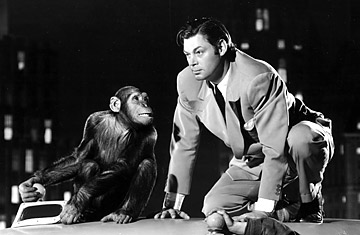
Cheeta and Johnny Weissmuller in Tarzan's New York Adventure.
From Lassie and Trigger to Gentle Ben and Babe The Talking Pig, the true-life stories of cinema's animal stars are seldom told. Fewer still get to tell the tale themselves. So a frisson of disappointment ran through London's literary circles last week when it was revealed that Me Cheeta,, the just-published memoirs of the chimpanzee who starred in 11 Tarzan movies from 1934 to 1948, is actually the work of a ghostwriter, James Lever. Even before the "autobiography" appeared to a string of rave reviews, expectations for Me Cheeta, had been primed when it was longlisted for the Guardian First Book Award. Whether Cheeta's (or indeed Lever's) name will be forced from the list we shall see. But the attention might hasten the book's U.S. publication, originally and hopefully slated for next spring.
None of which should deter potential readers; surely it's no longer a shock to discover that celebrities sometimes seek a little polish for their memoirs. And in this case, well, let's cut a chimp some slack here: Cheeta's screen career, which stretched right up to 1967 (Dr. Dolittle), called for a mastery of physical performance — mime, slapstick, acro- and aerobatics — not of stage English. Even his leading man, Tarzan, rarely ventured much beyond "Aaaheeyaaheeyaheeyaheeyah" or "Jane not worry." Now though, at the age of 76, and living out the last of his days in a Palm Springs sanctuary, Cheeta has found the voice to match his remarkable story.
Kidnapped from the Liberian jungle, Cheeta grew up fast in the libidinous jungle of Hollywood, hanging out with the alpha males — Kirk and Clark and Doug Jr. — and jostling for the attention of the dominant females — Kate and Marlene and Bette. He didn't stint with the booze and the Lucky Strikes, lost his virginity to a bonobo (a cruel joke played by Charlie Chaplin) and snorted "star-powder" (a homeopathic remedy, they told him). And despite his star billing, Cheeta had to put up with some pretty cutting social prejudice. At one typically drunken lunch party, Cheeta recalls, "Sylvia [Fairbanks] had pressed some bananas on me, and made a rather snippy observation when I declined and opted for the steak tartare and a cigarette."
Although he's nursed the slights for a few decades too long — most of his targets are dead, after all — Cheeta's comebacks have sharp teeth: Chaplin is a humorless "demi-ape"; Mickey Rooney gets pegged as "a cacophonous cartoon of glutinously faked ebullience" who basically stole Cheeta's act; and Rex Harrison ... well, frankly, his opinion of the gentlemanly English star who, as Dr. Dolittle, at least tried talking to the animals, is as mean-spirited as it is unpublishable on a family-oriented website. Far better is his elegant demolition of Mrs Fairbanks, who, he writes, was in truth "an absolute brick. I just didn't see in her that bloodcurdlingly shallow and avaricious gold-digger everyone tells you she became after Doug's death, when she was briefly and lucratively married to Gable."
At times ego gets the better of Cheeta, who sees himself as the "true pioneer of simian thespianism." He dismisses King Kong's contributions in a few words of faint praise and neglects to acknowledge the numerous other stand-in "Cheetas" in the Tarzan movies. He's less than forthright about the biting incidents that were said to have ended his Hollywood career. And his drinking habits can't have helped either — only the onset of diabetes forced him to become a teetotaler, albeit an unrepentant one: "There's a little more dignity in sharing a couple of cocktails, some caviar and a good cigar on a yacht with Katherine Hepburn and Nunnally Johnson than there is in washing down your sugar-free seventy-fifth birthday cake with a can of Diet Pepsi and a SpongeBob SquarePants hat askew on your head."
But what raises Me Cheeta above the run-of the-rumor-mill celebrity bio is the author's refracted take on Hollywood's human wildlife. He's fascinated, for example, by their obsession with sex. Among chimpanzees, the sex act tends to be brief and to the point, whereas almost every act by a male human in the book is seen as "an attempt to attract the attention of some sexually receptive females. ... as part of its elaborate courtship displays this species has invented telephones, moving pictures, cars, music, money, organized warfare, tigerskin rugs, alcohol, mood lighting, speedboats, mink coats, cities and poetry." Cheeta sees all this as central to man's great project: to rid the world of wild animals and bring them all to civilization. And he's delighted to be part of it.
Although Cheeta's life has crossed many divides there is a final one he cannot breach: "picture a human and a chimpanzee facing each other in awkward silence ... the faint inanity of the interaction stealing over both of them. That's what fame is." Celebrity memoirs that come to such highflown conclusions usually deserve a rude noise; Me Cheeta, though, should be greeted with hoots of approval.
